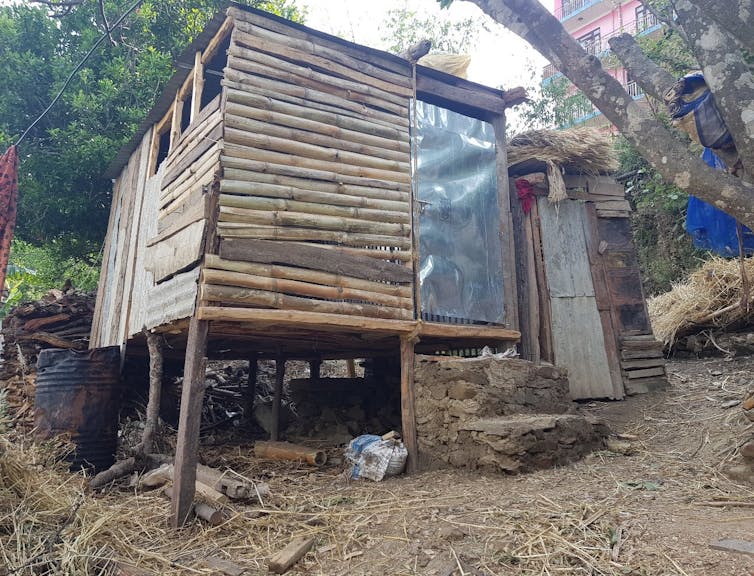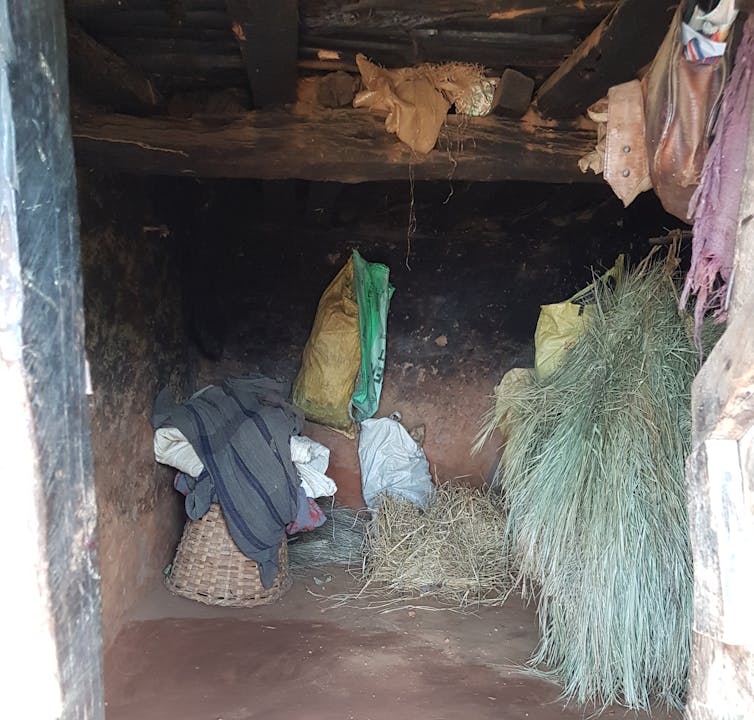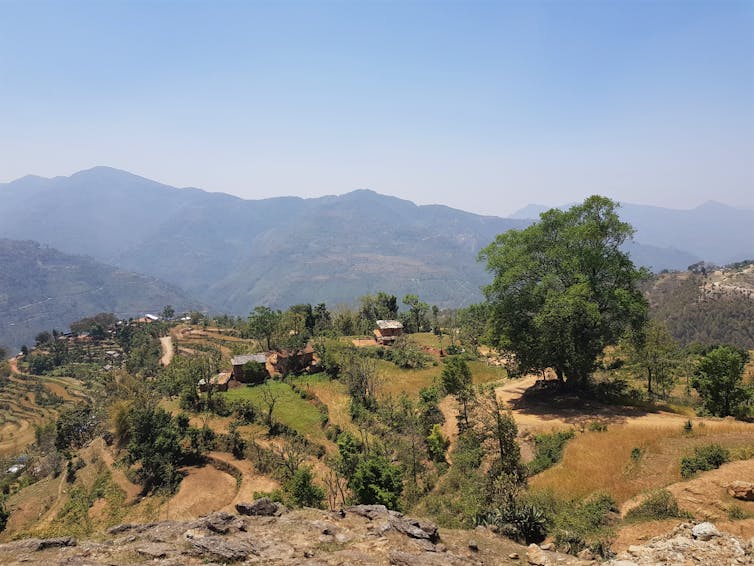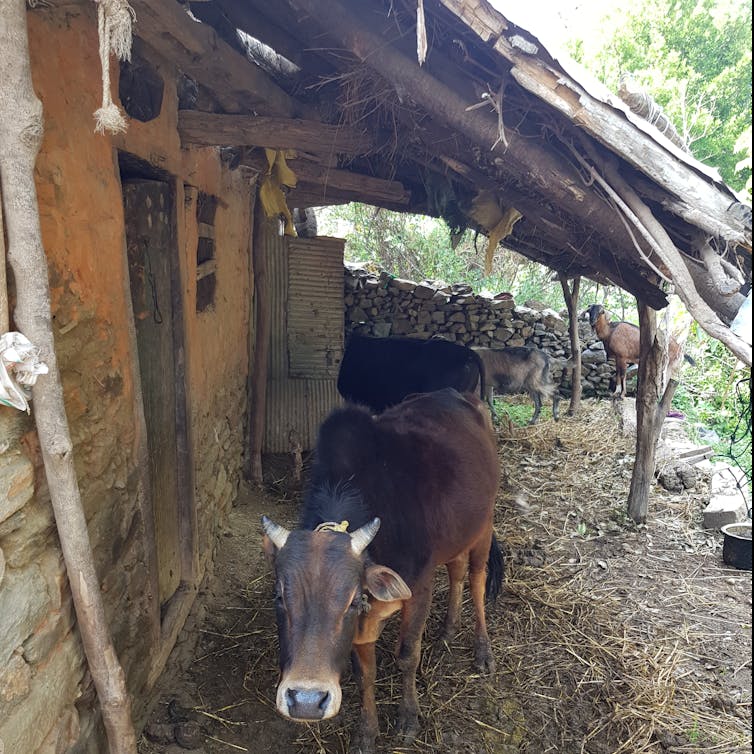
Melanie Channon, Author provided
Periods are still treated as a taboo subject in many parts of the world. Despite being a completely normal biological function, they are often seen as shameful, embarrassing and impure.
As a result, a wide variety of customs have developed around menstruation. In Nepal, the breadth and depth of menstrual taboos is particularly severe.
A woman or girl having their period might not be able to sleep in her own bed, engage in religious activities, eat or drink normal food, enter the kitchen, touch (or even look at) other people (especially men), use the family toilet, or even enter the family home.
In the west of the country, a practice known as “chhaupadi” prevails, which means that during menstruation you must sleep outside the family home, traditionally in a purpose built menstrual hut, known as a “chhau goth”. Or it might mean sleeping in a communal space above animal sheds, inside those sheds with animals, or even outside in the open air.
This practice has resulted in several deaths, most recently in December 2019, when Parwati Budha Rawat from Achham was so cold she lit a fire and died of suffocation due to lack of ventilation.
Chhaupadi was only officially criminalised in Nepal in August 2018, and enforcing the practice is now punishable by a fine or three months in jail. But the first arrest only occurred last week, in relation to the death in Achham.

Melanie Channon
And with the woman dead, who will be prepared to speak up? Herein lies the problem with criminalising chhaupadi – it requires women and girls to go to the police and speak out against their own families or neighbours. It would not be possible to report anonymously, so unless the community as a whole decides to outlaw the practice, criminalising it is of little practical use.
In our recent study looking at menstrual practices in the Dailekh district of Nepal (next to Achham district), we found that 77% of girls practiced chhaupadi (as did 72% in a separate study of Achham).

Melanie Channon
We also found that while 60% of girls knew chhaupadi was illegal, knowing about the law made no difference to whether or not it took place. Among those who knew about the law, many felt that it was pointless and couldn’t see how it would change anything.
We were told that volunteers had visited villages, informing people about the new chhaupadi law. But girls from those villages said the volunteers were still following chhauppadi in their own homes.
The adolescent girls we spoke to also described the fear and anxiety that came with menstrual taboos. Several said that they wished they had been born boys. One said:
Some girls are even scared that they might get raped and killed while staying outside. We hear news where girls die due to snakebites while sleeping outside their homes during their menstrual period.
And while chhaupadi has been criminalised, it is important to remember the many other harmful practices surrounding menstruation across Nepal. These include dietary restrictions, being prevented from going to important social events such as weddings, or simply being seen as unclean and impure. All take their toll on physical and mental health.

Melanie Channon, Author provided
So what can be done about such deep-rooted cultural practices? In another part of Nepal, one community leader has responded to the death in Achham by reportedly offering cash to women who reject chhaupadi.
A communal problem
Perhaps a monetary incentive or having a community leader prepared to take a stand will make a difference. The main response to criminalisation so far has been to destroy chhau huts. But this is not helpful, as most women and girls simply sleep in a different (and often less safe) place, frequently with animals or outside.
In our study, 96% of the girls we spoke to were keen to see a change in menstrual restrictions, but they were unsure about how to bring about that change. A lot of campaigns in the past have focused on knowledge about periods, distributing sanitary pads, and maintaining healthy practices.
These have been effective in some ways but do little to address chhaupadi. The girls we spoke to generally already understood menstruation and practised good menstrual hygiene.
We also found that the various cultural practices surrounding menstruation were affecting their mental (as well as physical) health. Despite being well educated about periods, girls did not feel able to fight taboos when so many senior people in their family, the community, and their religion believed in them.
Girls wanted to see change from the top with community and religious leaders taking a stand and publicly discarding practices of “untouchability” and chhaupadi. The government and the law were also discussed, with some saying that they wanted criminalisation strictly enforced, but others saying that this would cause problems if attitudes were not changed.
It is unsurprising that the law is not taken seriously as a force for change when the first arrest took 16 months. Ultimately, change must come from inside communities and cannot be forced by outsiders from Kathmandu or international organisations.![]()
Melanie Channon, Lecturer in Social Policy, University of Bath; Fran Amery, Lecturer in Politics, University of Bath, and Jennifer Thomson, Lecturer in Comparative Politics, University of Bath
This article is republished from The Conversation under a Creative Commons license. Read the original article.























